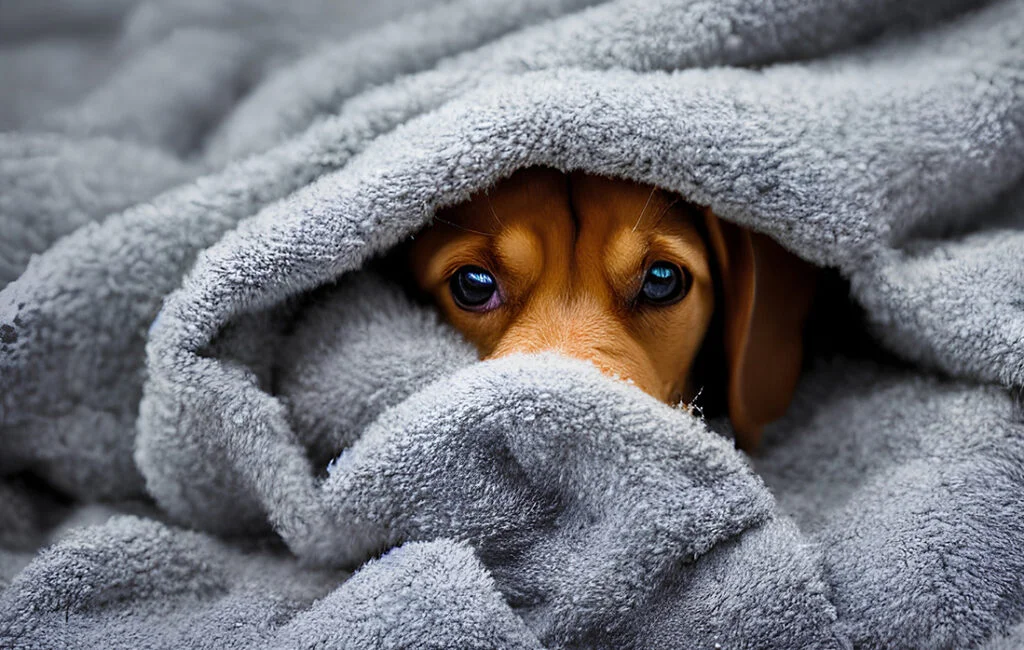
When it comes to sleep, man’s best friend has it made. Dogs seem to pass each day with some variation of: get up, bathroom, eat, nap, play, nap, eat, nap, bathroom, and wind down for bed. If it seems like your four-legged pal spends an excessive amount of time snoozing or relaxing so deeply they may as well be sleeping, you aren’t wrong — but it’s pretty normal dog behavior. We spoke with two veterinarians for everything you need to know about how much sleep dogs need.
How Much Sleep Do Dogs Need?
More than you might think! While individual dogs will have their own sleep needs and habits based on their age, health, breed, and even personality, there are some generalities.
- Puppies: “Many young puppies who spend a large part of their day exploring their new surroundings need a lot of time to recover, and they can often sleep up to 18+ hours daily,” Dr. Danielle Rutherford, DVM, consultant for Bausch & Lomb’s Project Watson, tells Sleepopolis.
- Adolescents: In dogs, adolescence is anywhere from six to 24 months. During this time, it’s normal for puppies to have excessive energy (it’s their rebellious stage!) and they’ll sleep hard in between rousing games of fetch. Adolescent dogs sleep less than they did as puppies, but Dr. Ross Elton, DVM and owner of Advanced Veterinary Care, says they’ll spend about half the day sleeping, roughly 10 to 12 hours a day.
- Adults: The average adult dog (which typically ranges from 1 and 7 years old) has similar sleep needs as adolescents. Elton says 10 to 12 hours a day is typical.
- Seniors: “Older dogs tend to tire more easily and need extended hours of sleep to recharge and recover,” says Rutherford. Seniors dogs (a stage that can vary depending on a dog’s size and breed) may sleep between 18 and 20 hours a day.
Does a Dog’s Breed Affect Sleep Need?
There is no research suggesting specific breeds need specific amounts of sleep. A better indicator of sleep needs might be activity level and size. “More active dogs exert more energy throughout the day and will require longer periods of time to recover,” says Rutherford. “This may cause them to feel more tired at night, and they may require more sleep. The same goes for larger breeds of dogs who generally require more sleep than small breeds.”
Why Do Dogs Sleep So Much?
While people have to juggle daily responsibilities even when they want to sleep, dogs generally have the luxury of curling up for a nap whenever they need it. And need it they do! “Though dogs have been domesticated for thousands of years, they are still considered predators,” explains Elton. “Like all predators, they only have a few activities. They hunt (our domesticated dogs head to the pantry or refrigerator), they eat, they play, and they mate. These roles can be performed in a set period of time (6-8 hours) and usually involve intense energy expenditure.” Sleeping for longer periods, then, is normal for a dog who is using that time to recharge that furry body.
“Sleep is very important for brain development, a strong immune system, and muscle recovery,” adds Rutherford. “Many important metabolic functions occur at rest, so it is important to make sure that our dogs are getting adequate sleep.”
Just like people, dogs who don’t get enough sleep are more prone to infection and plain old bad moods.
Signs Your Dog Isn’t Sleeping Enough
“Dogs that are not getting enough sleep at night tend to be less mobile and less apt to want to exercise during the day,” says Rutherford. “You may notice symptoms such as increased yawning, lack of self control, or irritability.” Lethargy, wandering without a purpose, and restlessness can be other signs that a dog isn’t getting sufficient sleep.
Potential Signs Your Dog Isn’t Sleeping Enough:
- Increased yawning
- Lack of self control
- Irritability
- Lethargy
- Wandering
- Restlessness
What’s Keeping Fido Up?
There could be a few things keeping your dog up at night. Rutherford points out that pain, anxiety, an inhospitable sleep environment and other irritants, like an uncontrolled itch, are all potential culprits.
“Some dogs have a cognitive decline with increasing age, which parallels human aging in many aspects,” adds Elton. “Cognitive decline in dogs has been associated with changes in sleep cycles.”
Why Is My Dog Restless at Night?
“Restlessness at night can be a common sign of pain in dogs,” says Rutherford. “If your dog’s sleep schedule has suddenly changed or they seem to have trouble finding a comfortable position at night, it is best to have them see a veterinarian to rule out any discomfort that may be preventing them from sleeping.”
General restlessness at night that is progressing over time may also be related to a dog’s advancing age. But it can also be a sign of a cognitive disorder, similar to dementia. “These dogs can pace at night and show signs of confusion,” explains Rutherford. “They can often be found staring at walls or getting stuck in strange positions, such as behind household furniture.” If your dog is exhibiting these symptoms, consider it another reason to visit the vet.
Dogs and Sleep Disorders
If you can’t blame sleep issues on your dog’s age, you could be dealing with a canine sleep disorder. “Sleep disorders are uncommon in dogs but they do exist,” says Rutherford.
Narcolepsy in Dogs
This condition is a nervous system disorder that typically affects younger dogs. During an episode (most often during physical activity like playing or eating), a dog will suddenly fall asleep, collapsing to the ground and not moving. Then, the dog will wake up and go on as though nothing happened. Episodes can last seconds to a few minutes.
Narcolepsy is often inherited, but it can be related to other health conditions, including obesity or disorders of the immune system. While it’s not a life-threatening condition, a diagnosis is still important, so you should speak to your vet if your dog experiences these episodes.
Like narcolepsy in humans, there is no cure for canine narcolepsy, but you may be able to reduce episodic frequency and severity by identifying possible patterns or triggers. Your vet may also want to prescribe medications to help manage frequency and duration of these episodes.
Obstructive Sleep Apnea in Dogs
Dogs can experience sleep apnea just as people do. While asleep, they stop breathing for a minute, which means they suddenly jolt awake in order to breathe. It makes for disruptive sleep, which can pose health risks. Sometimes, sleep apnea can be triggered by allergies or obesity.
Sleep apnea is often accompanied by snoring, but not all dogs who snore have sleep apnea. In fact, it’s not a commonly reported condition in dogs, though some breeds (brachycephalic dogs like pugs, bull dogs, Boston terriers, Pekingese, all characterized by short broad skulls and “squished” faces) are prone. If your dog snores, make sure to let your vet know, especially if you notice that your dog also experiences labored breathing while sleeping. Without treatment, your dog is at an increased risk of conditions like heart disease or high blood pressure.
REM Sleep Behavior Disorder in Dogs
While it’s not unusual for dogs to twitch or even softly woof in their sleep, excessive or violent physical activity during sleep (including biting, barking, chewing, howling, growling, or thrashing) can be a sign of something called REM sleep behavior disorder. Dogs with this condition — which can make an appearance at night or during daytime naps — will often wake up without appearing disoriented at all. The condition can be treated with medication to help minimize physical activity during sleep.
How to Help Your Dog Sleep Better
It’s true that dogs sleep differently than people, but their need for sleep to maintain their health is the same. Plus, getting your dog on a consistent sleep schedule makes life easier for you (no more middle-of-the-night bathroom breaks!). Here are a few tips from Rutherford and Elton to help your dog sleep better:
- Build a schedule. It’s helpful to start a schedule when you bring a puppy or shelter dog home. Keep in mind that puppies in particular can only go so long before needing to relieve themselves, so plan for late-night or early-morning bathroom breaks. A good rule of thumb is to count an hour for every month of age, then add one. That means a five-month old puppy can sleep about six hours before needing to go out. After about ten months, dogs can generally wait 10 to 12 hours.
- Manage their diet. “Encouraging good sleep starts with making sure your pet has a well balanced diet and eats an adequate amount throughout the day,” says Rutherford.
- Let them out before bed. Give your dog a chance to relieve herself before bed, and you’re more likely to cut down on middle-of-the-night wake-ups.
- Give them a quiet, dark, comfortable area to sleep every night. Your dog will sleep better with fewer distractions, so set up a special spot with a comfy blanket or dog bed. Many experts advise crate training, which can give dogs a safe, sheltered home base.
- Make sure they get regular exercise. All dogs need to be stimulated physically and mentally, so make sure they’re getting out or playing vigorously every day. A dog who spends all day doing nothing probably won’t be ready for bed when you are.
Are There Sleep Aids for Dogs?
“Sleep aids are available for dogs, and they should only be used as instructed by a veterinarian,” says Rutherford. Dogs experiencing wakefulness at night as a result of cognitive dysfunction or specific sleep disorders may be prescribed antihistamines or sedative medications to encourage sleep. “Dogs that are suffering from insomnia related to pain, anxiety or another medical condition should be treated for the underlying condition to relieve barriers to acquiring sleep,” she says.
FAQs
Do dogs sleep like humans at night?
While both dogs and humans need rest at night to recover from daily activities, a dog’s REM sleep is different. “Dogs tend to spend significantly less time in REM sleep than people, causing them to need more rest throughout the day,” Dr. Rutherford explains.
Why do dogs like to sleep with you?
“Dogs are traditionally pack animals,” explains Rutherford. “They gain comfort and security by being close to members of their pack, and dogs tend to sleep close to their owners for a sense of security.”
Why does my dog want to touch me when he sleeps?
Being in contact is a sign of a dog’s trust of his owner. “It helps to strengthen their bond with this family member,” says Rutherford.
The Last Word from Sleepopolis
“Sleep is one of the most important parts of our pet’s day,” says Dr. Rutherford. So if your dog seems to spend most of the day snoozing, it’s probably normal–even if it feels excessive. Dogs have their own quirks, just like people, and familiarizing yourself with your dog’s sleep schedule can be a good way to keep tabs on what can be considered normal for them. That’s how you’ll be able to identify sudden changes that could indicate an issue worth bringing up with the vet.


























